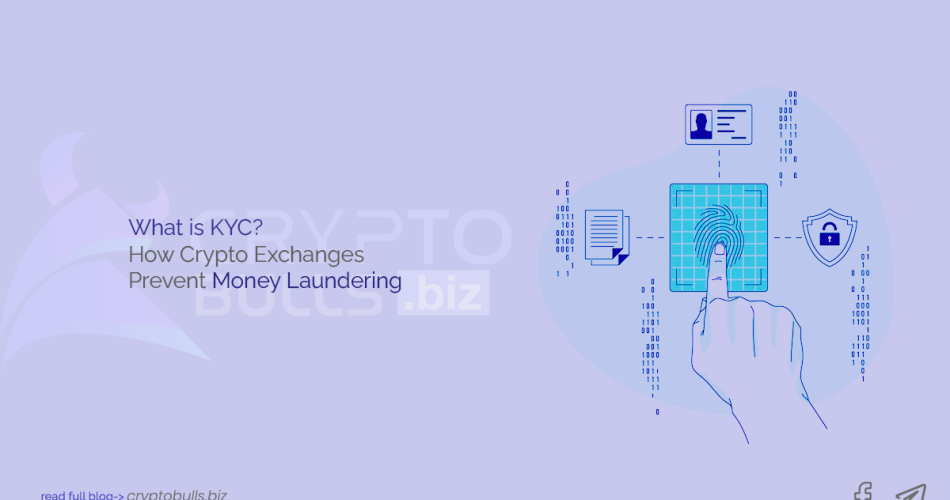What is KYC and How Crypto Exchanges Prevent Money Laundering
Imagine you’re at a party where you don’t know anyone. It’s easier to trust people when you get to know them, right? That’s what ‘Know Your Customer’ or KYC is all about. It’s a way for financial institutions to know who they’re dealing with, especially important now with the rise of digital money, or cryptocurrencies. This blog post will explain KYC, why it’s important for crypto exchanges, and how it helps prevent illegal activities like money laundering.
What is KYC?
KYC stands for ‘Know Your Customer’. It’s a process that financial institutions use to verify the identity of their customers. This is important for preventing identity theft, financial fraud, money laundering, and terrorist financing.
KYC has become a global standard that helps make sure every financial transaction is secure and safe. It’s a key part of creating a secure financial environment because it helps institutions understand their customers better and manage their risks wisely.
The way KYC verification is done can vary a lot depending on the country’s regulations. But the main goal is always to verify the customer’s identity. This is usually done by collecting and checking documents like passports, driver’s licenses, or national ID cards. The specific documents or information used can be different depending on the country’s rules.
KYC in Crypto Exchanges
Cryptocurrencies are becoming a significant part of the financial system. As a result, KYC requirements, which were traditionally associated with banks or stock exchanges, are now a growing part of this new financial landscape.
Crypto exchanges, much like traditional banks or stock exchanges, have adopted “Identity Verification” processes to comply with KYC regulations. This process is all about making sure that the person opening an account on the exchange is indeed who they claim to be, which helps reduce the risk of fraud.
The identity verification process in crypto exchanges typically involves several steps by which crypto exchanges can ensure the security of transactions and the integrity of the financial system.:
- Account Registration: This is the first step where users provide basic information to create an account on the platform.
- Identity Verification: In this step, users are required to submit identification documents. These could include a government-issued ID, proof of address, and in some cases, a selfie for facial verification.
- Data Verification: Once the user submits the required documents, the crypto exchange verifies the data to ensure its accuracy.
- Risk Assessment: Based on the collected information, the exchange creates a risk profile of the customer. This helps the exchange determine the level of due diligence required.
Preventing Money Laundering
Money laundering is a significant concern in the financial world, and crypto exchanges are no exception. To combat this, crypto exchanges have implemented strict KYC/AML (Anti-Money Laundering) policies. These policies are designed to deter and prevent criminals from using the services of a bank or exchange to launder money or cryptocurrency.
Money laundering involves disguising the origins of illegally obtained money and making it appear as though it came from legitimate sources. In the context of cryptocurrencies, this could involve transferring illicit funds through various crypto wallets or exchanges to obscure the money trail.
Crypto exchanges play a crucial role in preventing money laundering. They do this by monitoring transactions for suspicious activity, such as unusually large transactions or a high frequency of transactions in a short time. If a potential case of money laundering is detected, the exchange can freeze the associated accounts and report the activity to the relevant authorities.
Role of AML in Crypto Exchanges
AML policies play a crucial role in preventing money laundering. Just like traditional financial institutions, crypto exchanges are required to adhere to these policies to ensure the security of their platforms.
These policies involve a series of procedures, laws, or regulations that aim to stop the practice of generating income through illegal actions. Money launderers often try to hide their actions through a series of steps that make it appear as if the money coming from illegal or unethical sources was earned legitimately.
For instance, they might break up large amounts of money into less conspicuous smaller sums that are then deposited into a bank account, or they might use a series of complex transactions to obscure the money’s source. By implementing AML policies, crypto exchanges can detect and prevent these types of activities, thereby playing a crucial role in the fight against financial crime.
In addition to these measures, crypto exchanges also use advanced technologies such as blockchain analysis tools to trace the source and destination of funds. These tools can identify patterns of suspicious behaviour and help exchanges detect potential cases of money laundering.
Future of KYC and AML in Crypto Exchanges
Looking ahead, the procedures for KYC and AML in crypto exchanges are likely to evolve in response to developments in the broader cryptocurrency ecosystem. The advent of decentralized finance (DeFi) and privacy-focused cryptocurrencies could pose new challenges for KYC and AML. For instance, DeFi platforms operate on smart contracts and do not have a central authority, which could make KYC and AML compliance more complex. On the other hand, privacy-focused cryptocurrencies, which offer more advanced anonymization features than traditional cryptocurrencies, could make it harder for exchanges to trace transactions and identify users. Despite these challenges, the fundamental principles of KYC and AML – verifying the identity of users and monitoring transactions for suspicious activity – will remain critical for ensuring the integrity of crypto exchanges.
Case Studies
To illustrate the importance of KYC and AML in crypto exchanges, let’s look at a few real-world examples. In 2020, a major crypto exchange platform, BitMEX, was charged with violating AML regulations. The exchange agreed to pay as much as $100 million to resolve the charges, highlighting the potential financial risks for exchanges that fail to comply with AML regulations. In another case, a study by Coinfirm showed that 69% of crypto exchanges did not have complete and transparent KYC procedures in place, underscoring the need for robust KYC policies in the industry.
These case studies demonstrate the crucial role of KYC and AML policies in preventing money laundering in crypto exchanges. They also highlight the potential legal and financial consequences for exchanges that fail to implement these policies effectively.
Conclusion
While KYC and AML policies might seem like a lot of extra work, they play a very important role in keeping financial systems safe, including crypto exchanges. By putting these policies into action, crypto exchanges can create a secure environment for their users and help prevent financial crimes.
Even though cryptocurrencies are still a relatively new concept, the importance of KYC and AML is only going to increase as they continue to evolve. As we continue to move towards a more digital future, these processes will become even more crucial in making sure all financial transactions are safe and secure.
In essence, KYC and AML are not just about compliance but are key to building trust in the system. They ensure that while we enjoy the benefits of digital currencies, we are also protected from potential risks.


